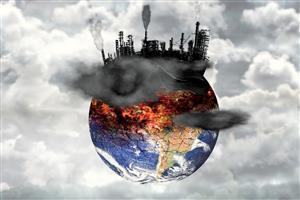- Main page
- News
GLOBAL CHALLENGES OF THE XXI CENTURY
1/6/2023
The rapidly changing environment requires a fundamentally new attitude to everything that surrounds us. Urbanization, digitalization, globalization, lead to an unprecedented surge of the unknown factors, which we inevitably face.
The volume of pollutants in the air, water, and soil is constantly growing so that it is quite justified to talk about an environmental crisis that can turn into an environmental catastrophe. Pollution of the natural environment is expressed in increasing smog, dead lakes, contaminated water, deadly radiation and the extinction of biological species. Uncontrolled consumption of natural resources for economic growth did not provide a universal solution to social and economic problems, and the environmental crisis that has come has worsened socio-economic situation. In the context of the ecological crisis and global warming, the problem of environmental protection and the preservation of the planet's ecosystem is particularly acute.
In 2015 The UN Commission has developed a document to ensure the implementation of the 17 Sustainable Development Goals (SDGs), in which information, knowledge, and education play a major role. In particular, SDG 13 "Taking urgent measures to combat climate change and its consequences" includes the solution of such tasks as: to improve education, dissemination of information and the ability of people and institutions to mitigate and mitigate the effects of climate change, adaptation to them and early warning.
Modern society is moving from an industrial status to an informational one, in which information and knowledge become a key resource. The qualitative transformation of society inevitably leads to the same change in education. It is the educational system that is able to solve the main problems of society of the XXI century. Kazakhstan in the context of the new challenges of a complex and dynamically developing world, must have all the priorities of ensuring high quality education and science.
The younger generation is the foundation of the future of Kazakhstan. In his message, the Head of State Kassym-Jomart Tokayev stressed that knowledge and professional skills were the key guidelines of the modern education system, training of personnel, and in the near future we should build the most pragmatic strategy for the transfer of technologies necessary for the country.
It should be noted that Al-Farabi Kazakh National University is the flagship of education not only in Kazakhstan, but it also holds a high international rating. For the successful implementation of life plans, the younger generation needs the formation of new thinking, self-awareness and social awareness, responsible decision-making, self-discipline, which will allow them to adapt in a rapidly changing world. Lifelong learning becomes the leitmotif of the entire educational process.
Modern education is personality-oriented. The student himself becomes the center of learning by choosing his own trajectory of education. Digital technologies, artificial intelligence, online, mobile and mixed forms of education are actively used nowadays. For example, a great future awaits VR technology — virtual augmented reality. In the next few years, more and more educational digital platforms will be supervised with the help of artificial intelligence. Experts predict that in the near future education will be more and more in demand. This means that it will be possible to choose the start date of training and move at your own pace, which will make the process of getting an education more convenient and accessible to people with different schedules. Thus, teaching staff prioritizes the formation of social responsibility, moral culture, humanistic worldview and readiness to gain new knowledge.
Kalkash ABUBAKIROVA,
Nina VORONOVA,

